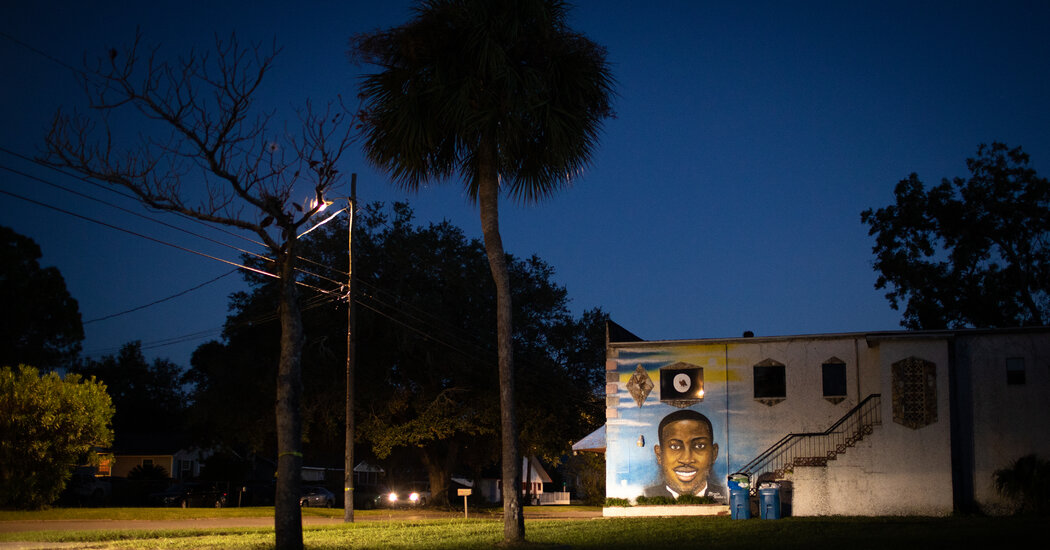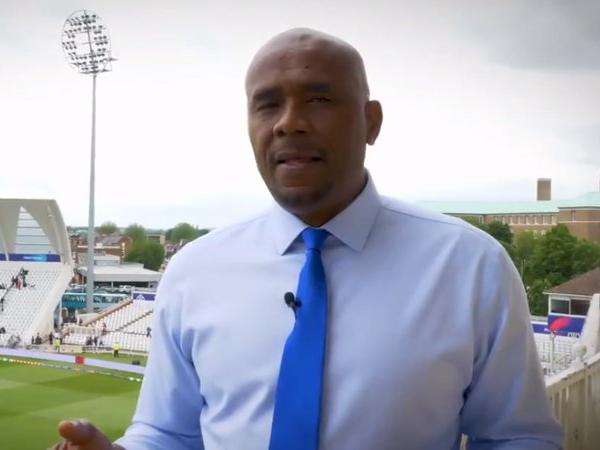

ATLANTA — The killing of George Floyd catalyzed a period of national soul-searching about race and racism that has touched nearly every aspect of American life. But in a number of high-profile trials since then — including in the murder of Mr. Floyd and the killing of Ahmaud Arbery — prosecutors have carefully avoided putting racism itself on center stage.
That changes as soon as this week, as federal prosecutors try to prove that the white men who killed Mr. Arbery, a 25-year-old Black man, committed a federal hate crime when they chased and killed him “because of Arbery’s race and color,” as their indictment puts it.
In the upcoming trial, prosecutors are almost certain to feature ugly evidence, culled from seized cellphones and other sources, seeking to prove that the three Georgia residents — Travis McMichael, 36, his father, Gregory McMichael, 66, and their neighbor William Bryan, 52 — harbored racist views before the afternoon in February 2020 when they gave chase to Mr. Arbery.
In one potential preview of the evidence to come, an F.B.I. agent testified at a Jan. 31 hearing that Travis McMichael’s text message history and social media posts include instances of his calling Black people “monkeys” and “savages,” and contain “evidence where the defendant expressed desires for crimes to be committed against African Americans.”
But racism alone isn’t a crime; experts say that prosecutors must convince a jury that it motivated the men to pursue and harm Mr. Arbery. The defendants have said that they pursued Mr. Arbery because they suspected him of break-ins in their neighborhood.
As a result, the trial presents a test for President Biden’s Justice Department and for Attorney General Merrick B. Garland, who has made the prosecution of hate crimes one of his top priorities.
“This is going to be a difficult case to prove,” said Deval L. Patrick, the former governor of Massachusetts who headed the Justice Department’s Civil Rights Division under President Bill Clinton. “It doesn’t mean the case isn’t there to be made.”
In state court, the three defendants have already been convicted of murder and have been sentenced to life in prison, with only Mr. Bryan’s sentence including the possibility of parole. All three could each face a maximum life sentence if found guilty in the federal trial.
On a practical level, a conviction in federal court would ensure that the defendants receive significant prison time even if their state murder convictions get overturned or their sentences reduced on appeal. On a symbolic level, the federal case gives prosecutors the opportunity to demonstrate the Justice Department’s commitment in fighting hate crimes.
But as prosecutors present the jury with explicit expressions of bigotry, the trial may also prove to be a difficult moment for a nation that remains bitterly torn over the extent to which its residents should openly confront the realities of American racism, both past and present.
Many are welcoming that confrontation, no matter how the jury rules. In Brunswick, the coastal Georgia city close to the neighborhood where Mr. Arbery was killed, the Rev. Darren West viewed the original murder trial as about not just a heinous crime but also the story of the everyday inequities and injustices experienced by African Americans in his community. In the murder trial, prosecutors made what appeared to be a strategic decision to largely sidestep issues of race as they presented their case to a nearly all-white jury.
Now, Mr. West is bracing for a new trial that will reveal the harsh and casual language of racism. It will be both uncomfortable and necessary, he said.
“Race and racism was always a part of this case. It was just unspoken. Now, race or racism will actually be on trial,” said Mr. West, who has led marches and rallies protesting Mr. Arbery’s death. “I think what we will hear is the kind of stuff this nation has been running away from or covering up for a very long time.”
The three men were charged with hate crimes and attempted kidnapping in a federal grand jury indictment in April 2021, nearly a year after their arrest on murder charges by the Georgia Bureau of Investigation. The McMichaels are also charged with one count each of having or discharging a firearm during a violent crime.
A jury will decide their fate at a time of rising hate-fueled violence and intimidation in the United States. According to the Federal Bureau of Investigation, there were 8,263 reported hate crimes in 2020, the highest level since 2001.
A forthcoming study by the Center for the Study of Hate and Extremism at California State University in San Bernardino notes that the number of anti-Black hate crimes in 2020 was the highest recorded since 2008, the year of Barack Obama’s presidential win.
Mr. Garland has vowed to sharpen the federal response, including better incident reporting and law-enforcement training.
But hate crimes are particularly hard to prove. Between 2005 and 2019, the Justice Department pursued just 17 percent of suspected hate crime cases for prosecution, according to a report released in July 2021.
When it does decide to prosecute, the cases usually end with defendants pleading guilty. In the Arbery case, a judge in late January rejected a proposed plea deal between federal prosecutors and the McMichaels after Mr. Arbery’s family members objected.
The federal government has a number of statutes it may rely upon to accuse someone of a hate crime. The Georgia defendants were charged under a 1960s-era statute that prohibits using threats or violence to prevent people from engaging in activities like voting, attending a school, dining at a lunch counter or, as in Mr. Arbery’s case, enjoying the use of a public street, because of their “race, color, religion or national origin.”
The Justice Department’s decisions about whether to bring hate-crimes or other civil rights-related charges have become a common plot point in a number of infamous acts of violence.
After a group of Los Angeles Police Department officers involved in the 1991 beating of Rodney King, a Black motorist, was acquitted by a California jury, setting off days of rioting, justice officials secured civil-rights indictments against the officers and won convictions against two of them.
Decades later, the Justice Department declined to bring civil rights charges against George Zimmerman, the Florida man who in 2012 fatally shot Trayvon Martin, a 17-year-old Black youth.
The shooting. On Feb. 23, 2020, Ahmaud Arbery, a 25-year-old Black man, was shot and killed after being chased by three white men while jogging near his home on the outskirts of Brunswick, Ga. The slaying of Mr. Arbery was captured in a graphic video that was widely viewed by the public.
More recently, in a highly publicized state trial last April, a jury found Derek Chauvin, the white former Minneapolis police officer, guilty of murder in the killing of George Floyd. In December, Mr. Chauvin pleaded guilty to federal charges of depriving Mr. Floyd of his civil rights by using unreasonable force on him.
But the lawyers in Mr. Chauvin’s murder trial treaded lightly when it came to race matters, much like the murder trial of the three Georgia men. In both trials, video footage of the violence perpetrated against the Black victims gave prosecutors a powerful tool in persuading jurors to arrive at guilty verdicts.
In the Arbery case, it is unclear if federal prosecutors will be able to introduce one of the most explosive allegations of racism, which emerged in a pretrial hearing in the state case: an accusation by Mr. Bryan that Travis McMichael used a racist slur shortly after fatally shooting Mr. Arbery.
Legal experts say that because Mr. McMichael has a constitutional right to confront his accuser, the judge may allow the accusation to be aired only if Mr. Bryan takes the stand. And because Mr. Bryan is also on trial, he could exercise his right not to testify. (Mr. McMichael’s lawyers dispute that he used the slur after the shooting.)
The proposed plea deals for the McMichaels amounted to an admission, on their parts, that they had been motivated by race when they went after Mr. Arbery. But the details of their scuttled agreements will not be admissible at trial.
A possible blueprint for the federal prosecutors’ case emerged at the Jan. 31 hearing over the plea deals. Tara M. Lyons, assistant U.S. attorney for the Southern District of Georgia, said that Travis McMichael did not belong to hate groups and did not “set out” to harm a Black person on the day of the killing. Rather, she said, “he had made assumptions about Ahmaud Arbery that he would not have made if Ahmaud Arbery had been white.”
The jury may have to decide whether such assumptions amount to sufficient evidence to prove a racial motive for the crime.
If that is what the trial boils down to, it may prove difficult to secure convictions, said Arthur Ago, director of the Criminal Justice Project at the Lawyers’ Committee for Civil Rights Under Law.
But no matter the outcome, Mr. Ago said, the trial will send a signal from the federal government: “If you have biases, and you are acting on those biases in a way that might not be explicit, we will come after you. Because that is a hate crime.”
24World Media does not take any responsibility of the information you see on this page. The content this page contains is from independent third-party content provider. If you have any concerns regarding the content, please free to write us here: contact@24worldmedia.com

Marnus Labuschagne Caught Off-Guard By ODI Captain Call After Steve Smith Snub

Everyone Is Looking Forward To It, The Standard Will Be Very High – Jacques Kallis On CSA’s SA20

Danushka Gunathilaka Granted Bail On Sexual Assault Charges

Ramiz Raja Sends Legal Notice To Kamran Akmal For Defamatory, False Claims Against The Board

Harbhajan Singh Reckons Mumbai Indians Should Release Kieron Pollard Ahead Of The IPL Auction 2023

Ian Bishop Praises Sam Curran For His Performances On Bouncy Australian Tracks

Why Choose A Career In Child Psychology?